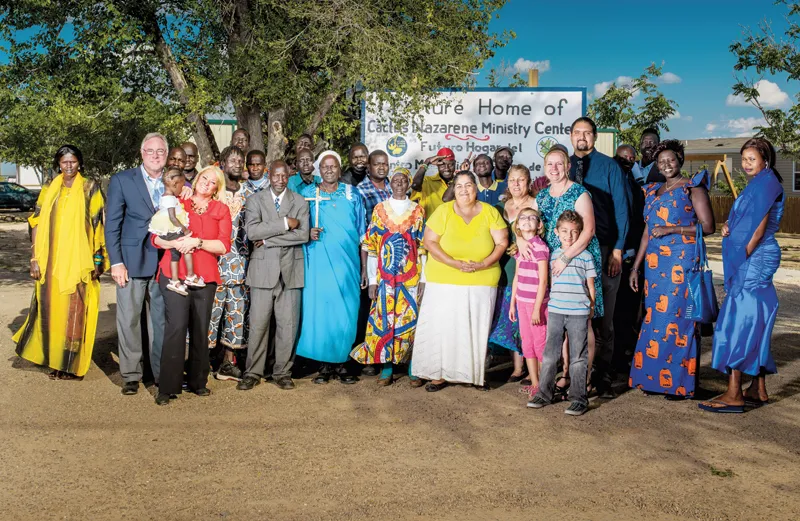A hot, dry October day in the Texas Panhandle. My husband, David, and I drove through parched, flat sagebrush desert until suddenly we came to a small town on State Highway 287. Cactus, Texas, the roadside sign announced.
This was our destination. A dusty main street cut through town, with a few stores, a water tower, some mobile homes. Nothing surprising there. But the people!
Women in vibrant Burmese wraps hauled groceries along the sidewalk. Tall, slender Sudanese men clustered on corners, talking and laughing. Asian children played soccer on a dirt lot while their mothers watched nearby.
Everywhere, in cars and in the stores and on the streets, Central American families bustled about, some dressed in brightly dyed Guatemalan ponchos and plastic sandals.
David and I had known about the Guatemalans. That’s why we were there. David is a district superintendent for our denomination, the Church of the Nazarene. He’d recently been appointed to oversee the 100 churches of a roughly 100,000-square-mile area in West Texas.
We were driving around the district visiting churches, including Cactus’s tiny Spanish-speaking congregation, which was comprised largely of Guatemalans. But what was this virtual United Nations of immigrants doing in a remote Texas town?
The whole scene took me aback. It wasn’t so much the diversity. In fact, I embrace that. It was the poverty. Many of the mobile homes were rusted and collapsed, their roofs anchored by spare tires. Tumbleweeds blew down the streets.
Men slumped in front of a gas station drinking from bottles in brown paper bags. The only spruced-up building on the main drag was a gold-domed mosque.
The worst part was the smell. The air reeked of methane and heaven knew what else. I could hardly breathe as we pulled up to the tiny, rented cinderblock building where our Hispanic congregation met.
We’d brought our five-year-old grandson along on this trip. He dubbed the odor “the Cactus smell.”
Yet when we got inside, the small sanctuary was packed, every wooden pew filled, with just six inches between pews. The praise band played for nearly an hour.
The pastor, a woman named Elda whom my husband had coaxed out of retirement, preached in Spanish to an eager sea of faces. Our grandson found other kids his age and settled in.
After the service, we joined the congregation for a traditional Guatemalan meal, in our honor. David and I talked with a number of the English-speaking church members. I was bursting with questions but didn’t want to sound rude.
“You’re probably wondering what all these different people are doing here in the middle of the Panhandle, aren’t you?” a woman said, smiling. I nodded.
“It’s the meatpacking plant,” she said. “Just outside town. One of the biggest in Texas. They process something like four to five thousand cattle a day. Almost everyone works there. A few years ago, authorities raided the place and found the plant was employing huge numbers of illegal immigrants. After that, the company switched to recruiting refugees who have legal permission to live in the United States.
"We have folks from Guatemala, Myanmar, Somalia, Sudan. Just about every war-torn country. Most of the Somalis are Muslim, as are the Burmese. But there are some Christians too, particularly among the Sudanese and Guatemalans. They come here for worship, to one of several Protestant congregations that rent this building, or to the Catholic parish. That’s about it for churches.”
While David continued talking, I took our grandson outside to play. The odor of the packing plant and feed lot was overpowering, but the kids didn’t seem to mind.
Watching them run around a dirt lot, I tried to sort out my feelings. I grew up in small-town Oklahoma, down the street from the house where Garth Brooks, the country music star, was raised. My childhood was about as All-American as you can get.
Yet I knew America had changed, even in small towns like Cactus. David and I had served as missionaries in South Korea for five years. I’d also traveled extensively working for an international adoption agency in Fort Worth.
I was comfortable around different cultures. And I knew in my heart the church exists to serve those in need. But Cactus overwhelmed me. The need seemed so huge. And immigration is such a hot-button issue in Texas. Was it really a good idea to get involved?
David finished visiting and we got back in the car. We prayed as we headed toward our next destination.
“Lord, this town, this church, need you in a big way,” David said. “Show us how to bring the resources of our denomination to serve this place. We remember your words in Scripture: ‘Blessed are the poor in spirit, for theirs is the kingdom of heaven.’”
Less than an hour later, David’s cell phone rang. “Hey, Harley Man,” said the caller. David rode a motorcycle, so that was his nickname in our previous district.
“It’s Ron, from Ohio. Guess what? I’m a rich man! They found gas and oil on my land. I just felt moved to call you up and ask if you have any projects you could use forty thousand dollars for. You name it, I’ll send you a check.”
I felt a tingling sensation. Whatever doubts I’d wrestled with, standing outside the little church in Cactus, vanished. It was obvious God himself was opening a door for us.
David told Ron we sure could put that money to good use. We spent the rest of the drive dreaming up projects we could start up.
A short time later, David returned to Cactus along with Sam, a fellow Nazarene from Amarillo, to talk with residents and community leaders and get a feel for how the church could help.
The main priority was a building, both for worship and to house community-service projects such as ESL classes, free legal aid and health clinics. David wanted to include everyone in Cactus, so he visited with Rasheed, a Muslim leader of the Somali community.
Rasheed told him he’d be pleased to see the church expand its offerings. He suggested not putting the word church on the sign, so no one felt inadvertently excluded.
“What if we call it a ministry center?” David asked.
“Perfect,” said Rasheed.
A plan took shape. We’d solicit donations and buy one of those warehouse-style building kits, then ask church volunteers to help put it up. David and Sam filmed video footage of Cactus and made a short movie to show at the Nazarene district convention the following spring.
It seemed like everyone we told about Cactus wanted to donate. Not only that, but Sam’s daughter Jenni and her husband, Vito, pastors of a Nazarene church in Wisconsin, phoned out of the blue to say that the minute they heard about our project, they felt called to serve in Cactus.
“I know it sounds crazy,” Jenni said. “But Vito and I were missionaries in Guatemala. We’re fluent in Spanish and we really feel like the Lord is calling us. If there’s work we can do there, let us know.”
Soon we were fielding offers from volunteer work teams to help erect the 9,000-squarefoot steel building—they raised walls, welded, installed electricity.
Vito and Jenni moved to Cactus and immediately set about partnering with the local school district to serve free lunches to kids who go hungry during the summer when the school cafeteria is closed.
Elda retired (again) and Vito took over as interim pastor of the Guatemalan congregation. A Sudanese man named Chol, whom David had met on his filmmaking trip the previous fall, encouraged other Sudanese families to come to a newly formed African church.
Chol was one of the “Lost Boys” of Sudan, orphaned in that country’s civil war. Only he and an older cousin escaped when troops destroyed their village. Yet you couldn’t imagine a man more filled with God’s spirit.
Today, Chol is a ministerial student and assistant lay pastor of the African Nazarene church in Cactus, working alongside a Sudanese pastor and church planter named Michael.
The African congregation meets at the YMCA while everyone waits for the finishing touches on the ministry center, which still needs heating and air-conditioning.
Already we’ve been using the building for occasional “free-market” days, when we turn the main hall into a bazaar of donated food, clothing and other household items.
When it’s finished, the beige-and-green metal-sided Cactus Nazarene Ministry Center will have worship space for a number of different ethnic congregations, ESL classrooms, legal-aid meeting rooms and even temporary housing for Nazarene missionaries who are serving short-term stints in Cactus.
Recently, David and I stood under a rare shade tree at the site of our new ministry center, surrounded by Africans. We shared in their excited conversation about the ministry center’s progress and potential.
I thought back to my first day in Cactus, that shell-shocked feeling as I gazed around at the seemingly desolate town.
Now Cactus seemed anything but desolate. Everywhere I looked I saw evidence of God at work.
Yes, I thought, America has changed. But when Jesus tells us to serve “the least of these,” he doesn’t distinguish between languages or nationalities.
“For I was hungry and you gave me food, I was thirsty and you gave me drink, I was a stranger, and you took me in,” our Lord says. It’s that simple. So in Cactus, Texas, that’s what we do.

Download your FREE ebook, The Power of Hope: 7 Inspirational Stories of People Rediscovering Faith, Hope and Love.






